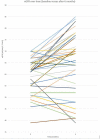Retrospective analysis on the effect of Reverse Diabetes2 Now on kidney function in patients with type 2 diabetes with impaired kidney function
- PMID: 36619323
- PMCID: PMC9813621
- DOI: 10.1136/bmjnph-2021-000397
Retrospective analysis on the effect of Reverse Diabetes2 Now on kidney function in patients with type 2 diabetes with impaired kidney function
Abstract
Objective: Type 2 diabetes is one of the main causes of kidney damage. Recent intervention studies suggest that the progression of type 2 diabetes can be halted, or even brought into remission by lifestyle interventions. In a pragmatic trial, the Reverse Diabetes2 Now programme (RD2N, NL: Keer Diabetes2 Om), a multicomponent lifestyle intervention, reduced the need for bloodglucose lowering medications up to 24 months.
Research design and methods: Here, we retrospectively investigate the effect of RD2N on markers of kidney function in patients selected for impaired kidney function at baseline (eGFR <70 mL/min/1.73 m2 (n=45). Baseline data were retrieved from the intervention database and follow-up data on renal markers were collected from routine medical records. Wilcoxon non-parametric tests were used to assess changes over 6 and 12 months.
Results: After 6 months median eGFR increased significantly from 62.0 (IQR 55.5-65.0) to 69.0 (IQR 55.0-76.5) mL/min/1.73 m2 (p=0.002). Median albumin/creatinine ratio (n=26) remained within the normal range (<3 mg/mmol). The effect on eGFR was similar after exclusion of patients in whom medication was changed (median eGFR 62.0 ((IQR 59.5-66.0) to 69.0 (IQR 60.0-77.0) mL/min/1.73 m2, p=0.006, n=29), suggesting that the effect on eGFR is not related to medication changes. At 12 months, eGFR was not significantly changed (n=22, median eGFR 63.5 mL/min/1.73 m2 (IQR 58.5-71.0), p=0.067).
Conclusions: The retrospective nature of this study and the despite guidelines limited availability of renal markers in routine type 2 diabetes care are limiting. Nevertheless, these data support a favourable effect of RD2N on renal function. Further research, with proper documentation of renal function, urinary protein excretion and dietary intake, is needed to substantiate these results, ideally in a large-scale prospective cohort study.
Keywords: Blood pressure lowering; Diabetes mellitus; Dietary patterns; Nutritional treatment; Weight management.
© Author(s) (or their employer(s)) 2022. Re-use permitted under CC BY-NC. No commercial re-use. See rights and permissions. Published by BMJ.
Conflict of interest statement
Competing interests: No, there are no competing interests.
Figures
Similar articles
-
The kidney and cardiovascular outcome trials.J Diabetes. 2018 Feb;10(2):88-89. doi: 10.1111/1753-0407.12616. J Diabetes. 2018. PMID: 29031006
-
Early detection of diabetic kidney disease by urinary proteomics and subsequent intervention with spironolactone to delay progression (PRIORITY): a prospective observational study and embedded randomised placebo-controlled trial.Lancet Diabetes Endocrinol. 2020 Apr;8(4):301-312. doi: 10.1016/S2213-8587(20)30026-7. Epub 2020 Mar 2. Lancet Diabetes Endocrinol. 2020. PMID: 32135136 Clinical Trial.
-
Effect of dapagliflozin on the rate of decline in kidney function in patients with chronic kidney disease with and without type 2 diabetes: a prespecified analysis from the DAPA-CKD trial.Lancet Diabetes Endocrinol. 2021 Nov;9(11):743-754. doi: 10.1016/S2213-8587(21)00242-4. Epub 2021 Oct 4. Lancet Diabetes Endocrinol. 2021. PMID: 34619108 Clinical Trial.
-
Observational study on dietary changes of participants following a multicomponent lifestyle program (Reverse Diabetes2 Now).J Hum Nutr Diet. 2022 Oct;35(5):791-803. doi: 10.1111/jhn.12976. Epub 2021 Dec 29. J Hum Nutr Diet. 2022. PMID: 34967062
-
Subclinical Kidney Damage in Hypertensive Patients: A Renal Window Opened on the Cardiovascular System. Focus on Microalbuminuria.Adv Exp Med Biol. 2017;956:279-306. doi: 10.1007/5584_2016_85. Adv Exp Med Biol. 2017. PMID: 27873229 Review.
Cited by
-
The case for a ketogenic diet in the management of kidney disease.BMJ Open Diabetes Res Care. 2024 Apr 27;12(2):e004101. doi: 10.1136/bmjdrc-2024-004101. BMJ Open Diabetes Res Care. 2024. PMID: 38677719 Free PMC article. Review.
References
LinkOut - more resources
Full Text Sources
Research Materials
Miscellaneous


